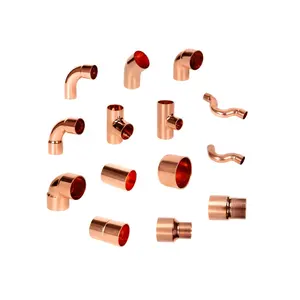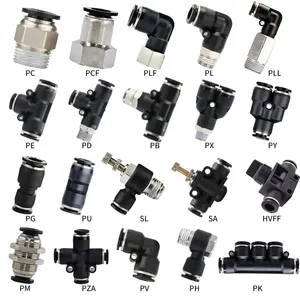(321 products available)




































































































































































































An air tool swivel fitting is designed to allow a hose to rotate freely while the tool is in use. Air tool swivels allow greater flexibility and less twisting of the hose, thereby improving performance and reducing wear. These fittings are available in a variety of styles to meet different application requirements.
Push-to-connect swivel fittings are designed to connect quickly and securely without the need for additional tools. The push-to-connect mechanism simplifies installation and ensures a tight seal. These fittings can rotate to allow the hose to move freely, preventing kinks and tangles. Push-to-connect swivel fittings are often used in applications that require frequent hose changes or where space is limited.
Barbed swivel fittings have a rotating base that allows the hose to twist freely. The barbed end provides a secure connection by gripping the inside of the hose. Barbed swivel fittings are available in various sizes to accommodate different hose diameters. They are commonly used in pneumatic and air tool applications that require flexibility and maneuverability.
Threaded swivel fittings have male or female threads that can be easily connected to other threaded components. The swivel feature allows the fitting to rotate 360 degrees, preventing hose twisting and improving work efficiency. Threaded swivel fittings come in various configurations, such as NPT, BSPT, and metric threads, to suit different application needs. They are commonly used in industrial and automotive settings.
Pneumatic swivel fittings are designed to connect pneumatic systems and tools, providing flexibility and preventing hose damage. They are often made of brass, stainless steel, or other durable materials to withstand high-pressure environments. Pneumatic swivel fittings come in various shapes and sizes, such as elbow, tee, and straight configurations, to accommodate different applications. They are commonly used in robotics, automation, and other pneumatic systems that require hose rotation.
These are some standard specifications that apply to most air tool swivel fittings:
The air tool swivel fitting is usually made of brass, stainless steel, or zinc. Zinc air tool swivel fittings have good strength and are resistant to corrosion.
The standard connection sizes of air tool swivel fittings for air tools are 1/4 inch and 3/8 inch. The connection types are threaded and push-to-connect.
The pressure rating is the maximum pressure that the air swivel tool fitting can bear. The standard pressure rating is about 150 psi, but it can be higher for some fittings.
Regular maintenance is crucial for the performance and longevity of air tool swivel fittings. Here are some tips for maintaining air tool swivel fittings:
It is important to inspect the air tool swivel fitting regularly to ensure there is no corrosion, damage, or leakage. If there is any sign of wear or damage, replace it immediately.
Clean the surface of the air tool swivel fitting periodically to remove dust, dirt, or debris. This can prevent particles from entering the fitting and damaging the sealing surface. For cleaning, use a soft brush or cloth and a mild solvent.
Lubrication is essential for air tool swivel fittings. Apply a small amount of lubricant to the swivel and thread connections on a regular basis. This can reduce friction and wear, and ensure smooth operation.
Choose the correct type and size of the air tool swivel fitting for the application. Make sure the fitting is properly installed and tightened. Avoid overtightening, as this can damage the fitting. Also, do not expose the fitting to overload conditions. Proper use and installation can extend the lifespan of the fitting.
Air tool swivel fittings are used in various industries and sectors that require the use of air tools. Here are some common scenarios.
In the automotive industry, the air tool swivel fitting is used in auto repair shops, car manufacturing plants, and car maintenance workshops. It is used to connect air tools such as impact wrenches, pneumatic drills, and sanders to air compressor systems. This ensures that the air tools are able to rotate and move freely when being used, which increases efficiency and productivity during repair and assembly tasks.
In the construction industry, air tool swivel fittings are commonly used in tasks such as framing, nailing, and sanding. The swivel fitting connects air tools like nail guns, sanders, and spray guns to air compressor systems. It enhances the movement of the air tool. This, in turn, leads to increased flexibility and improved workmanship.
In the metalworking industry, the air tool swivel fitting is used to connect air tools such as die grinders, sanders, and drills to air compressor systems. This enhances the precision and control of the tools during grinding, sanding, and drilling tasks.
In the woodworking industry, air tool swivel fittings are used to connect air tools such as nail guns, sanders, and drills to air compressor systems. The swivel fitting enhances the mobility of the air tool. This, in turn, leads to increased productivity and efficiency during tasks such as cutting, sanding, and joining wood.
In the aerospace industry, swivel air fittings are used to connect air tools like rivet guns and sanders to air compressor systems. The fitting allows the air tools to rotate and move freely when being used. This enhances precision and control during assembly and fabrication tasks.
When choosing air tool swivel fittings for customers, buyers should consider the following factors.
It is important for buyers to ensure that the air tool swivel fittings they buy are durable and stable. They should choose metal fittings made of corrosion-resistant and strong materials. Additionally, buyers should select reliable brands and reputable suppliers to ensure the fittings meet quality standards.
Buyers should choose swivel air fittings with threads that are compatible with their customers' air tools and equipment connections. Additionally, buyers should ensure that the threads are suitable for different types of pipes and air hoses to achieve versatile use.
When choosing air tool swivel fittings, buyers should consider the size, including the port and tube. They should make sure their choices are suitable for the air tools and equipment their customers use to ensure the fittings fit securely and work properly. Additionally, buyers should consider buying fittings of different sizes to meet different usage requirements.
Buyers should choose air tool swivel fittings with maximum working pressure that can meet their customers' usage requirements. They should also ensure that the fittings can work together with other air components, such as air compressors and air hoses, to ensure the entire system has a safe working pressure.
Buyers should choose swivel fittings with the appropriate swivel function according to their customers' specific requirements. Additionally, they should ensure the fittings' swivel angle meets the operators' flexibility needs.
Buyers should consider the environmental conditions in which the air tools and fittings will be used. For example, when working in harsh or outdoor environments, buyers should choose fittings with additional protection against dust, moisture, or impact to ensure their durability.
Q1 What is the difference between regular and industrial swivel air fittings?
A1. Regular swivel fittings have a smaller 1/4-inch diameter and are used in light-duty pneumatic tools. Industrial swivel fittings have a 3/8-inch diameter and are used in heavy-duty tools.
Q2 Can pneumatic tools use brass fittings?
A2. Yes. Brass fittings are suitable for pneumatic tools. They are usually used with high-pressure lines.
Q3 Are there left-hand swivel air fittings?
A3. Air tool swivel fittings are used to prevent hose twisting. They are reversible if left-hand threads are required.
Q4 What are the benefits of push-to-connect air fittings?
A4. Push-to-connect air fittings make instant, secure connections without tools. They are easy to use and speed up the assembly process.